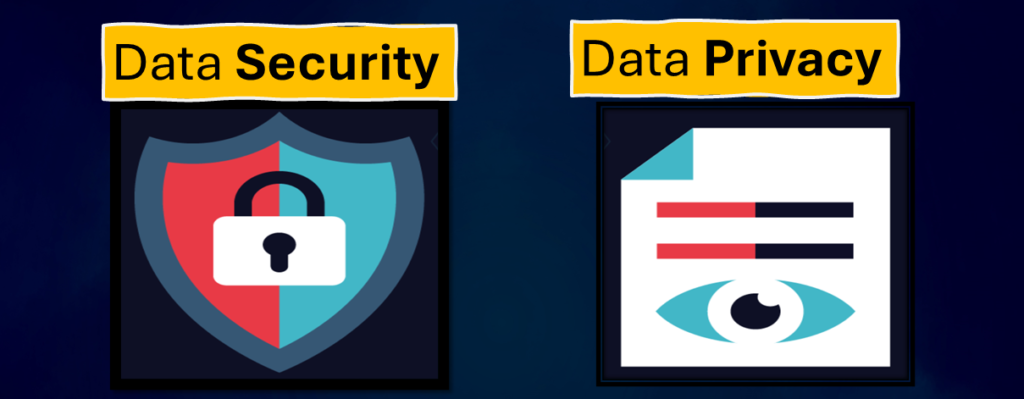In today’s data-driven world, our personal information is constantly collected, stored, and used by businesses and organizations. While we all want the benefits of the digital age, concerns about how our data is handled are paramount. This is where two crucial concepts come into play: Data Security and Data Privacy. Often used interchangeably, they represent distinct, yet interconnected, aspects of information protection.

Data Security: The Fortress Around Your Information
Imagine data as a valuable treasure. Data security is like building a high-tech fortress around it. It’s a set of policies, procedures, and technologies designed to safeguard data from unauthorized access, use, disclosure, disruption, modification, or destruction. The core principles of data security are:
- Confidentiality: Ensuring only authorized individuals can access and view sensitive information.
- Integrity: Maintaining the accuracy and completeness of data throughout its lifecycle.
- Availability: Guaranteeing authorized users can access the data whenever needed.
Data security measures can be physical or logical. Physical security might involve restricted access to data centers, security cameras, and even biometric locks. Logical security encompasses a broader range of tools and practices, including:
- Firewalls: Act as gatekeepers, filtering incoming and outgoing traffic to block unauthorized access attempts.
- Antivirus and anti-malware software: Protect systems from malicious programs that can steal, corrupt, or destroy data.
- Intrusion detection and prevention systems (IDS/IPS): Monitor network activity for suspicious behavior and can take steps to prevent security breaches.
- Encryption: Scrambles data using a secret key, making it unreadable to anyone without the key. Encryption is crucial for protecting data at rest (stored on devices) and in transit (being transmitted over networks).
Data Privacy: Empowering You to Control Your Information
Data privacy focuses on the rights of individuals regarding their personal information. It’s about giving you control over how your data is collected, stored, used, and shared. Here’s what data privacy entails:
- Transparency: Businesses must be clear about what data they collect, why they collect it, and how they will use it. Individuals have the right to be informed.
- Consent: Businesses should obtain your explicit consent before collecting and using your personal data. This empowers you to choose whether or not to share your information.
- Data Minimization: Organizations should collect only the data necessary for a specific purpose and not retain it longer than required.
- Right to Access: You have the right to access your personal data held by an organization and understand how it’s being used.
- Right to Rectification: If your data is inaccurate or incomplete, you have the right to have it corrected.
- Right to Erasure (Right to be Forgotten): Under certain circumstances, you can request that your personal data be deleted.
The Interplay of Data Security and Data Privacy
While data security and data privacy are distinct concepts, they are deeply intertwined. Strong data security practices are essential for upholding data privacy rights. If data is not secured, breaches can occur, exposing personal information and violating privacy. Conversely, robust data privacy policies can guide data security measures, ensuring data is collected and stored only as authorized.
The Importance of Data Security and Data Privacy in Today’s World
Data breaches are a growing concern, with businesses and individuals alike susceptible. Stolen data can be used for identity theft, financial fraud, and other malicious activities. Strong data security measures help mitigate these risks and protect sensitive information.
Data privacy empowers individuals and builds trust with organizations. By respecting user privacy rights, businesses can foster stronger relationships with their customers. Additionally, data privacy regulations like GDPR hold organizations accountable for how they handle personal information.
Conclusion
Data security and data privacy are two critical pillars of information protection in the digital age. Businesses have a responsibility to implement robust security measures to safeguard data, while respecting individual privacy rights. Individuals, in turn, should be aware of their rights and take steps to protect their own data. By working together, we can create a more secure and trustworthy digital environment for everyone.
================================